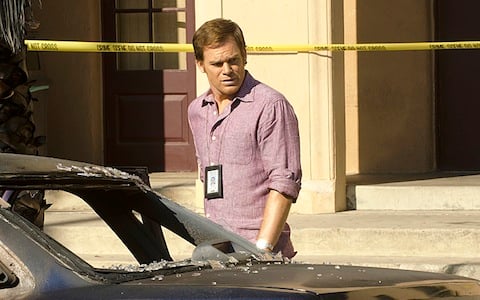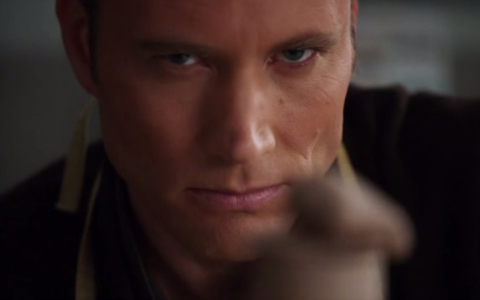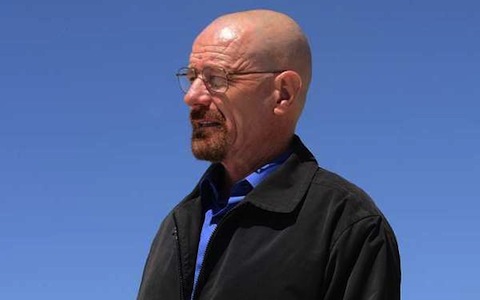5 Great TV Characters With A Secret Dark Side

Inspired by tonight's premiere of NBC's new drama Do No Harm, we came up with our list of characters with a hidden dark side. These aren't merely characters leading secret lives, or suffering from some uncontrollable Jekyll & Hyde complex. These are characters who present themselves with one personality to the public, often including their seemingly closest friends, but are secretly harboring a dark and dangerous side that comes out in other circumstances and adds a layer or two of complexity to who they really are.
Here's our list of our five favorite recent TV characters with a dark side.

Ben Zajac - Boss
In a way, every politician that has ever run for public office has a split personality. Whether peddling outright lies, making complicated issues sound simple or fudging the truth in order to turn polarizing ideas into mantras many can get behind, those who need the public’s support are never completely forthright. The better among them are always on, cleverly calculating how even the slightest mannerisms will be interpreted by the public. Some of that is the game of politics that has to be played, but when taken to the extreme, it can border on alarming. Just ask Boss’ Ben Zajac. The man Tom Kane chooses to run for Illinois governor is a womanizing, backstabbing borderline sociopath in private, but in public, he’s exactly what the fine voters of Illinois need to move away from the old corruption and into the peaceful light.
Not only does he cheat on his wife, he gets off on doing it when she’s merely feet away. He’s the type of guy that will try and get in a quickie during the minute and a half it takes his spouse to walk to the bathroom, and unfortunately for Boss’ main character Tom Kane, he’s also the type of guy who will exploit any angle to push himself ahead. He’s unrelentingly selfish, but with a careful smile and a stream of comforting words he has an endless supply of, he’s able to hide his true personality and present a layerless face to the general public and even to some of his co-workers. He’s a shitbag, but viewed from the right angle, he’s extremely electable.

Emily Thorne - Revenge
On the surface, Revenge’s Emily Thorne is a prime example of a sweet and charitable wealthy individual, with enough diplomacy to seem at ease and collected, as well as a prize catch for any young man. Actress Emily VanCamp’s character is exactly what fans should expect a well-bred Hamptons frequenter to be. She has love interests and charities, she dresses well and makes comments that both the men and women in high society can appreciate. She’s beautiful, but more importantly, she’s graceful. However, beautiful and graceful doesn’t exactly make for interesting television.
Your Daily Blend of Entertainment News
To spice things up a bit, the sweet and subtle “Emily” is not exactly who she seems. She’s really named Amanda Clarke, a young woman raging on the inside about her father’s mistreatment by people manipulating the law and his ultimate death at the hands of his enemies. As the namesake implies, she’s out to get revenge, and she’ll stop at nothing, not even blackmail or murder setups, to bring about her own sort of high-end vigilante justice. When viewers often see multiple personalities pop up on television, there’s frequently a clear line dictating the two personalities, but Emily is all the more risky, because she is always flirting with danger and teetering on the brink of losing control. It’s her bouts with toeing the line that makes Revenge equal parts gripping and equal parts climactic.

Dexter Morgan - Dexter
On the surface, to most people, Dexter Morgan appears to be just your average nice guy, working a steady job as a blood spatter analyst at Miami Metro Homicide. Most people would never suspect that he secretly moonlights as a serial killer. Dexter's dark side is exposed to us when he's on the hunt and ready to kill his next targeted criminal.
Some might call Dexter a vigilante, but to me, that implies that his highest priority is righting wrongs, serving justice and/or keeping the streets safe from rapists and murderers. At best, targeting criminals is a justification for his actions, but his "code" was really laid out as a means of allowing him to satiate his craving for blood while putting himself at minimal risk for getting caught - and maybe to appease his now-deceased father's conscience.
Because he chooses to live a life out in the open, working as a forensic export, socializing and presenting himself as Joe-average, the series shows Dexter in two different lights. Masked Dexter is the one who smiles and waves, acting as though he couldn't hurt a fly. Dexter unmasked is revealed to us when he's on the hunt or in his kill room. With his Dark Passenger exposed, we see the darkest, most vulnerable side of the character. Some characters have glimpsed the real Dexter, but most of them aren't around anymore. And there are a few key characters who lived to tell but haven't and probably (hopefully) won't. But for the most part, the show remains largely reliant on Dexter's ability to keep his friends and coworkers from ever seeing who he truly is.

Dr. Rich Stephenson - Community
He's not part of the Community group of seven, although Annie did push for him to have a spot in "Asian Population Studies," but recurring character Dr. Rich Stephenson has made quite an impression in just three appearances. Especially on Annie. But especially on Jeff. Introduced in "Beginner Pottery," where his non-beginner skills earned him the nickname 'Doc Potterywood' from a certain jealous member of the class not to mention a healthy dose of suspicion into why this all too nice guy (played by Greg Cromer) is taking a class way below his level. That's some sociopathic behavior that not only makes Jeff start Goldblum-ing but also ultimately reveals the tortured mind behind Rich's pathologically nice persona.
You see, Jeff's mom filled his head with too much support while Rich's, well, her love was a bit more Psycho meets Ordinary People. "Not that it will ever bring your brother back to life. It was supposed to be you on that roller-coaster, Richard. It was supposed to be you!"
Jeff's mistrust continues in "Epidemiology," Season 2' Halloween episode, where his diagnosis is wrong and his heroics are short-lived to say the least (hiding a bite, that's so Britta), however, his psychosis is never really addressed again. He just seems like such a nice guy, which brings us back to "Asian Population Studies," that ends with Jeff running into his arms soaking wet, looking for advice on how to be a better person... or at least look like one to manipulate people. If he only knew how deep the crazy well went. After being absent from Season 3, I hope the fourth not only brings Rich back into the equation but we finally get some resolution on those mommy issues.

Walter White - Breaking Bad
If Walter White started out as a mild-mannered chemistry teacher with nothing to hide, the last five seasons of Breaking Bad have seen him develop not only plenty of secrets, but a serious dark side to his personality as well.
One of the most fascinating aspects of Breaking Bad has been watching Walter change before our very eyes. While still presenting his family and the world with the image of a quiet chemistry teacher and family man, Walter has hidden the growing truth - that the identity he created for “Heisenberg” the drug lord has become more than just something he does from necessity. It’s become a part of who he is.
Over time the Heisenberg personality has become darker, more pronounced, and led Walter to do things that he – and we as viewers - could never have imagined when the series began. In its final season, Breaking Bad gives us a man who has two distinct personalities, and it’s hard to tell at this point which one is the real Walter. The Walter White who no longer bats an eyelash at murder is a man who would not be recognized by his family, and the reasons for his actions have changed from acts of desperation to something very different. Walter White’s dark side reminds us of what can happen when good people are driven to dark and dangerous acts, and its sharp contrast with the decent, loving father he started out as only serves to make it more frightening.
